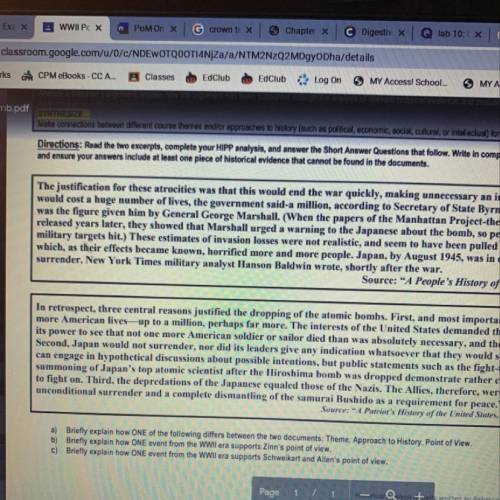
The justification for these atrocities was that this would end the war quickly, making unnecessary an invasion of Japan. Such an invasion
would cost a huge number of lives, the government said a million, according to Secretary of State Byrnes; half a million, Truman claimed
was the figure given him by General George Marshall. (When the papers of the Manhattan Project-the project to build the atom bomb-were
released years later, they showed that Marshall urged a warning to the Japanese about the bomb, so people could be removed and only
military targets hit.) These estimates of invasion losses were not realistic, and seem to have been pulled out of the air to justify bombings
which, as their effects became known, horrified more and more people. Japan, by August 1945, was in desperate shape and ready to
surrender. New York Times military analyst Hanson Baldwin wrote, shortly after the war.
Source: "A People's History of the United States, Howard Zinn, 1980
In retrospect, three central reasons justified the dropping of the atomic bombs. First, and most important, the invasion of Japan would cost
more American lives—up to a million, perhaps far more. The interests of the United States demanded that the government do everything in
its power to see that not one more American soldier or sailor died than was absolutely necessary, and the atomic bombs ensured that result.
Second, Japan would not surrender, nor did its leaders give any indication whatsoever that they would surrender short of annihilation. One
can engage in hypothetical discussions about possible intentions, but public statements such as the fight-to-the bitter-end comment and the
summoning of Japan's top atomic scientist after the Hiroshima bomb was dropped demonstrate rather conclusively that the empire planned
to fight on. Third, the depredations of the Japanese equaled those of the Nazis. The Allies, therefore, were justified in nothing less than
unconditional surrender and a complete dismantling of the samurai Bushido as a requirement for peace."
Source: "A Patriot's History of the United States, Larry Schweikart and Michael Allen, 2007
a) Briefly explain how ONE of the following differs between the two documents: Theme, Approach to History, Point of View.
b) Briefly explain how ONE event from the WWII era supports Zinn's point of view.
c) Briefly explain how ONE event from the WWII era supports Schweikart and Allen's point of view.


Answers: 1
Another question on History

History, 21.06.2019 13:00
What is a connection among sectionalism, slavery, and states’ right as cause of the civil war? how did the southern response to the 1860 election results demonstrate this connection?
Answers: 3

History, 21.06.2019 16:30
Which option most accurately explains roosevelt’s motivation in forming the bull moose party? a. he thought that president taft had failed to continue his policies of progressive reform. b.he thought president taft’s conservation legislation was effective but poorly timed. c.he wanted to change president taft’s foreign policy toward asia. d. he saw that president taft focused on antitrust legislation to the exclusion of other reforms.
Answers: 1

History, 22.06.2019 00:00
Respond to the scenario regarding spanish colonial life in latin america.you are a creole living in venezuela. your family is wealthy and you are well educated. through your education, you have learned about enlightenment ideas regarding life, liberty, and property. although you are not in a position of power, you enjoy a comfortable life. when a revolution spreads in your country, you are faced with a decision to become a supporter of venezuelan independence, or support spain, and your current way of life. what do you do? write 5 paragraphs
Answers: 1

History, 22.06.2019 03:30
The rise of advertising in the 1920s. i am good with seeing how advertisements shape the roaring twenties and how it developed a new way of life through modern days. but i am not sure what the details of advertising in the 1920s were. if possible can you send me links (preferrably credential links) to sources that maybe show like the first company to start advertising through the radio, how advertising benefits (statistics graphs), etc.
Answers: 2
You know the right answer?
The justification for these atrocities was that this would end the war quickly, making unnecessary a...
Questions



History, 22.10.2019 06:00

Chemistry, 22.10.2019 06:00

Mathematics, 22.10.2019 06:00


Mathematics, 22.10.2019 06:00


History, 22.10.2019 06:00

Mathematics, 22.10.2019 06:00




English, 22.10.2019 06:00

English, 22.10.2019 06:00



English, 22.10.2019 06:00




